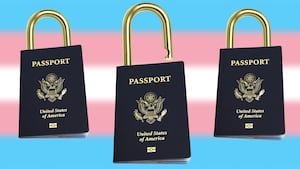Researchers writing in one of the world’s most influential medical journals have urged doctors to learn how to interact with non-binary patients.
“As our society’s concept of gender evolves, so does the visibility of contemporary non-binary people,” University of Minnesota medical school resident Dr. Walter Liszewski and his co-authors wrote in a perspective piece for the most recent issue of the New England Journal of Medicine. “Yet many members of the medical community may not know how to interact with non-binary patients respectfully or recognize their unique needs and barriers to care.”
Among the most troubling survey findings that Liszewski highlights: nearly a quarter of “gender-minority patients” have avoided going to the doctor “for fear of discrimination,” and roughly one in five have been denied medical treatment based on their identity.
“Our findings really highlight that there’s a lot of skepticism and hesitancy around non-binary and gender non-conforming patients to engage with health care professionals,” Liszewski, who was not available for comment, said in a press release.
Non-binary people, who identify as neither strictly male or female, face a litany of potential problems in doctors’ offices, as outlined in Liszewski’s paper.
First, intake forms and medical records might not allow gender options besides male or female, which can lead doctors and nurses to misgender non-binary patients, many of whom use “they” and “them” as singular pronouns and some of whom may even have “X” listed on their official IDs, thanks to recent progress in states like New York and California.
After clearing that initial hurdle, non-binary patients may have to educate physicians about their gender identity. Even though non-binary people “face known health disparities,” as Liszewski notes, they may find it hard to get the right care “if a physician makes assumptions about their sex, gender, or anatomy.”
That applies to both more general care and to any transition-related medical treatments that non-binary patients might seek in order to alleviate gender dysphoria, like hormone therapy and surgeries.
Citing guidelines from the San Francisco-based Center of Excellence for Transgender Health, Liszewski and his co-authors recommend that doctors can ask for an “organ inventory” rather than making assumptions about a non-binary patient based on their physical appearance. In other words, doctors can determine which non-binary patients might need mammograms and which prostate exams without assigning them a gender.
Doctors can also use intake forms that ask patients to highlights any differences between the sex they were assigned at birth and their current gender, thereby flagging a transgender or non-binary status before the first patient interaction takes place.
“My hope is that physicians who read the article will become aware of non-binary patients, and realize we need to do a better job of allowing these individuals to access quality health care,” said Liszewski.
The paper is the latest and one of the most high-profile calls for physicians—who, incidentally, are still learning how to care for transgender men and women—to find ways to be more inclusive of non-binary people, many of whom report facing challenges at the doctor’s office
In the final 2018 issue of Annals of Family Medicine, for example, researchers affiliated with Boston’s Fenway Institute and the Human Rights Campaign highlighted the need for physicians to avoid “communication missteps” with non-binary patients—and to apologize when they do. For instance, doctors can use a general term like “chest” with non-binary patients rather than the more gendered term “breasts” in order to make physical exams more comfortable.
“As an underserved population at disproportionate risk for discrimination, victimization, and suicidal ideation, non-binary people are especially in need of health care clinicians who affirm their gender identities,” the researchers argue.
HRC Youth And Families Program Coordinator Sula Malina, one of the co-authors of the Annals of Family Medicine paper—and a non-binary person who uses “they” as a personal pronoun—said that they “became committed to this work after leaving a doctor’s office in tears, worried that few providers out there would understand how to address my body and identity.”
Recent data backs up Malina’s anecdotal experience: a December 2018 survey of primary care clinicians—also published in the Annals of Family Medicine—found that they were “more likely to report willingness to care for transgender patients than they were to report feeling capable of providing routine care to this patient population.”
In other words, even those clinicians whose hearts are in the right place can still mess up when it comes to interacting with transgender and gender-nonconforming patients.
That’s in part due to a lack of medical education around transgender and non-binary identity in schools.
In the New England Journal of Medicine article, Liszewski and his co-authors call attention to the fact that although “specialty clinics” are cropping up for transgender and gender non-conforming people, “not all patients will want to use—or have access to—these institutions.”
For example, a transgender or non-binary person living in New York City might have access to the Callen-Lorde Community Health Center or the Center for Transgender Medicine and Surgery at Mount Sinai. But outside of urban centers, options for such tailored care tend to be fewer and further between.
“To ensure access to gender-affirming health care for non-binary people more broadly,” the researchers wrote, “best practices will have to be disseminated beyond specialized centers.”







